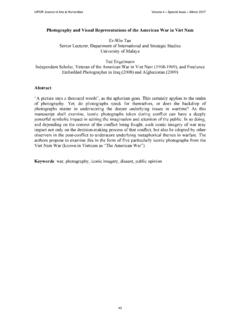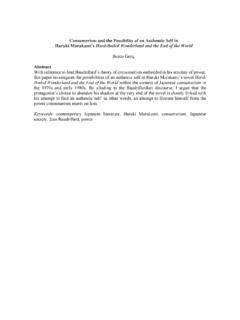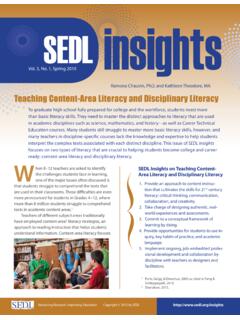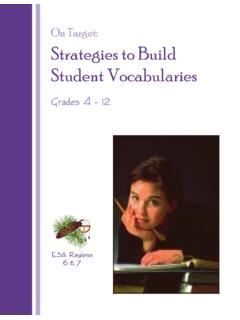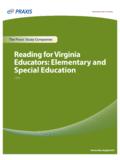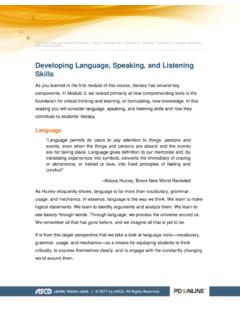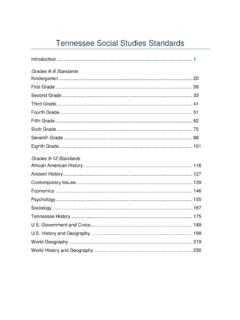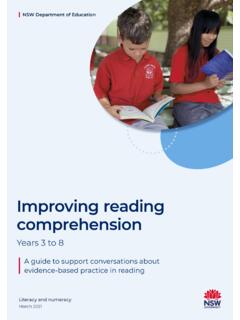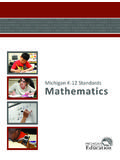Transcription of Strategies and Problems Encountered by Teachers in ...
1 The IAFOR Journal of Language Learning Volume I - Issue I - Winter 2014. Strategies and Problems Encountered by Teachers in Implementing mother tongue - Based Instruction in a Multilingual Classroom Jane K. Lartec, Anastacia M. Belisario, Jamaica P. Bendanillo, Hanni K. Binas-o, Novefirst O. Bucang, and Jan Lorie W. Cammagay School of Teacher Education, Saint Louis University, Baguio City, Philippines, Abstract The use of mother tongue in teaching in a multilingual setting affects the way pupils learn. A melting pot and the educational center of the North, Baguio City, Philippines demands teaching Strategies that not only adapt to the interplay of the different cultures and languages but give importance to them, too. Specifically, this paper analyzed the Strategies of Teachers in implementing mother tongue - Based Instruction in a Multilingual Classroom and identified some Problems that Teachers encounter in implementing them.
2 The study used qualitative analysis with interview as the main data gathering tool. The respondents were Teachers purposively selected from the suggested pilot schools of mother tongue - Based Multilingual Education (MTB-MLE) in Baguio City. From the phenomenological analysis of the data, the findings showed that the Teachers used Strategies such as translation of target language to mother tongue , utilization of multilingual teaching, utilization of lingua-franca, improvization of instructional materials written in mother tongue , remediation of instruction, and utilization of literary piece written in mother tongue as motivation. Some Problems Encountered by the Teachers in implementing mother tongue - based instruction include absence of books written in mother tongue , lack of vocabulary , and lack of teacher-training.
3 Nevertheless, the study indicated that major attention and effort are still necessary to be given to the approach. Keywords: practices, mother tongue - based instruction, multilingualism, and multiculturalism 1. The IAFOR Journal of Language Learning Volume I - Issue I - Winter 2014. 1. Introduction The role of language as a medium of instruction in promoting an effective teaching and learning is an issue that has occupied many scholars all over the world for many years (Orr 1987a, 1997 as cited by Deyi, et al., 2007). This role of language as a medium of instruction has been a concern mostly in countries where immigrant children are in the minority such as United States and Canada (Krashen, 1981 as cited by Deyi, et al., 2007). It is in these countries where research has been widely conducted and a number of legislations have been passed and amended throughout the years.
4 Despite such developments, debates on the use of language persist. One of the latest developments in the Philippine educational system is the mother tongue Based Multilingual Education (MTB-MLE). MTB-MLE refers to the use of students' mother tongue and two or more additional languages as Languages of Instruction (LoI) in school. In other contexts, the term is used to describe bilingual education across multiple language communities each community using its own mother tongue aside from the official school language of instruction. In South Asia, multilingual education usually follows the first definition, learning and using multiple languages in school. In some countries, MTB-MLE includes four languages the students' mother tongue or first language, a regional language, the national language and an international language (Malone, 2007).
5 According to the official language policy of the 1987 Educational Act (revised in 2004), children in Grades 1 3 were to be instructed in their first language, while those in Grade 4 onwards are set to be instructed using a second language (L2), which is English. This language policy can be identified as a possible model for bilingual education (Borch & Tombari, 1997 as cited by Ndamba, 2008). Many studies have already revealed that teaching using the mother tongue in the early grades enhances children's ability to learn better compared to the use of a second or foreign language (UNESCO, 2003; Skutnabb-Kangas, 2003 as cited by Rai, et al., 2011). It has also been reported that if children are taught in languages which are different from their home language or mother tongue , they drop out from school, have low academic performance, and repeat classes due to a high failure rate.
6 This state of affairs is still persistent in Nepal (Yadava, 2007; Awasthi, 2004 as cited by Rai, et al., 2011). Research on L2 acquisition shows that when a child masters the first language then learning another language becomes less problematic in the habits of speech, listening, reading, and writing (Maclaughlin, 1987; Krashen, 195; Ndamba 2008. citing Cummins, 1981; Hawes, 1979; Obanya, 1985; & Dawes, 1988). Research that has been conducted on language education has also shown that children are quicker to learn, to read, and to acquire other academic skills when instructed in the language that they speak at home rather than taught in an unfamiliar language (Langer, et al., 1990; Unicef, 1999). Recently, in the educational reforms in the country, the mother tongue in the regions plays an important role especially in the educational system.
7 To strengthen this, the Department of Education (DepEd) has implemented the use of mother tongue as a medium of instruction (DepEd order No. 74, series of 2009). 2. The IAFOR Journal of Language Learning Volume I - Issue I - Winter 2014. No research has been conducted on the effective Strategies of Teachers in implementing the MTB-MLE in a multilingual education. The city of Baguio (Philippines) is considered to be a home to many immigrants from other parts of the country and other countries. A significant population of foreigners and local people contributed to the diversity of the city's culture. The languages that are commonly spoken are Kankanaey, Ibaloi, Ilocano, Kapampangan, Pangasinense, Tagalog, English, Chinese, and recently Korean. Having different languages in the city has been a concern.
8 The Problems include what Strategies can be employed by the Teachers in successfully implementing MTB-MLE. This study explored the Strategies employed by the Teachers in implementing MTB . MLE and the Problems that they have Encountered . It specifically dwelt on answering the following research questions: What are the Strategies employed by the Teachers in using MTB-MLE in the multilingual classrooms? And, what the Problems Encountered by the Teachers in employing the MTB-MLE? 2. Methods Participants Twelve Teachers from Kindergarten to Grade 1 from the three pilot schools in the city of Baguio were chosen by the researchers as respondents based on the inclusion criteria set for the study ( Teachers who are teaching in the pilot schools and teaching Kinder to Grade 1). These Teachers had their rich experiences in employing and implementing the MTB-MLE in the pilot schools and they have tried different Strategies in teaching in the early grades in a multilingual classroom.
9 These pilot schools were chosen because they implemented the MTB-MLE for the city considering the nature of the learners in these schools. Baguio City is known to be a melting pot of different language and culture in the Northern Philippines, so the pupils have diverse background in terms of language and culture. Having 12 interview subjects for the study was arrived at based on phenomenological inquiry and data saturation criterions. According to Creswell (1998), phenomenology requires in-depth interviews from 3 to 13 subjects. Data Collection Tools A semi-structured in-depth interview (Patton, 1990) was used as data gathering tool. An aide memoire which probed the dynamics of the Teachers ' experiences in employing MTB-MLE in teaching the Kinder and Grade 1 in the pilot schools was developed by the researchers based on a priori code.
10 Their sharing revolved around the questions, What were your experiences with teaching the Kinder/ Grade 1 using MTB-MLE? What are the Strategies that you used in using MTB-MLE? What do you think were the best Strategies that you have employed helped facilitate the learning of the pupils? What were the Problems that you have Encountered in using MTB-MLE? Why do you consider these as your Problems ? . If the interviewer is skilful, Best and Kahn (1993) believe that the interview can be regarded as data gathering device which is often superior to others as people are more willing to talk than to write, and confidential information may be obtained from respondents who might be reluctant to put it in writing. The interview was considered suitable in this study in order to determine respondents' opinions, attitudes or trends 3.

